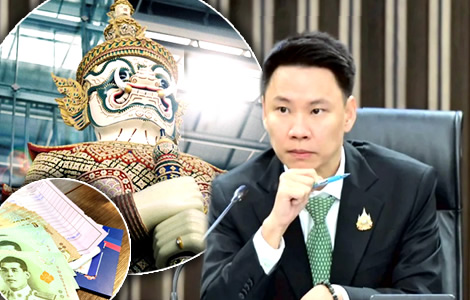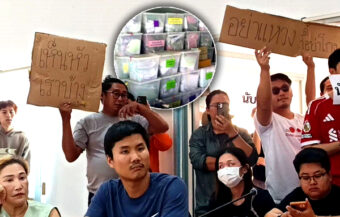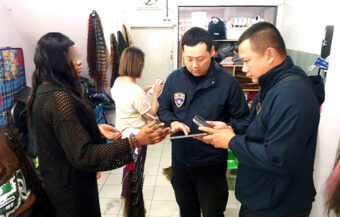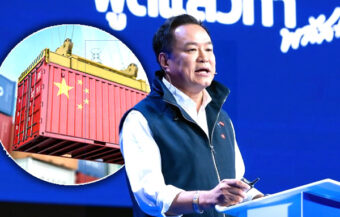Thailand’s long-delayed ฿300 tourism tax is finally set to launch under Minister Atthakorn, promising automatic insurance coverage for all foreign visitors and billions in tourism revenue, but after years of broken promises, sceptics question if it will truly happen.
Tourism and Sports Minister Atthakorn Sirilathayakorn has vowed to finally launch Thailand’s long-delayed ฿300 foreign tourism levy, a move certain to spark criticism but already winning quiet support from some industry insiders. The key reason? It includes automatic insurance coverage for all foreign tourists—something many argue is urgently needed. First proposed in 2019, the levy has been repeatedly promised and repeatedly shelved. On Friday, Atthakorn made clear he’s fast-tracking it, positioning safety and accountability as priorities. After years of broken promises, the pressure is now on him to deliver where others have failed.

Thailand’s new Minister of Tourism and Sports, Atthakorn Sirilathayakorn, has vowed to finally introduce the country’s long-proposed ฿300 tourism tax. The charge, which has languished in policy limbo since 2019, will now be implemented within the next four months.
Although the tax was originally approved by Cabinet in early 2023, multiple administrations have delayed its rollout. Indeed, it was first tabled in 2019. Now, Atthakorn says the delay has gone on too long—and the cost of inaction has been high. “We intend to implement it within the next four months,” he said. “The message to tourists must be clear: this fee is for their benefit.”
According to the Ministry, the tourism fee will be charged to all foreign visitors arriving by air, sea, or land. While air travellers will pay ฿300 per entry, the fee for land and sea arrivals may also be raised from the previously proposed ฿150 to match the same level. In that case, it would be valid for multiple entries within 30 to 60 days.
Tourism tax will fund automatic insurance coverage and upgrades to infrastructure for all foreign visitors
Part of the fee—an estimated ฿70—will be allocated toward automatic travel insurance for each tourist. This coverage will apply from the moment a visitor enters the country.
The remainder of the revenue will go toward improving tourism infrastructure, upgrading emergency response systems, and supporting long-term development.
Although critics have called it a new burden on travellers, tourism executives have welcomed the move. Many believe the tax will help restore Thailand’s reputation and increase visitor confidence.
Negative global coverage in recent years has highlighted situations where foreign tourists in Thailand were left without financial support after accidents or emergencies. These incidents often forced families to launch crowdfunding campaigns to pay hospital bills, generating international headlines and damaging the country’s image.
In some cases, foreign nationals faced medical bills in the hundreds of thousands of baht. For life-threatening injuries or evacuation by air ambulance, costs can rise to ฿1.5 million. Without insurance, most tourists have no safety net. Atthakorn said this is exactly what the fee aims to fix. “Safety is the foundation of tourism,” he noted. “If people do not feel protected, they will not return.”
Successive ministers failed on the levy while emergency funds option remains limited and inaccessible
Although Thailand already has a small state-managed compensation fund for special cases, officials admit it is difficult to access. Many tourists are unaware it exists.
Moreover, the fund is limited in both scope and reach. As a result, every Tourism Minister since 2019 has faced pressure to create a better system—yet none followed through.
This time, the Ministry says things will be different. The fee will be paired with a clear insurance scheme. A Thai insurance company or consortium will be appointed to manage the coverage.
Additionally, a dedicated fund will be established to administer the revenue collected. Final details—including maximum coverage limits and how to file claims—are expected to be released before the end of the year.
However, the government is also aware that poor communication could derail the plan. Past discussions of the tax created confusion among tourists. Many assumed it was a hidden fee or simply a government money-grab.
To counter that perception, Atthakorn stressed the need to clearly explain the benefits. “If we impose this tax, we must communicate how much tourists could benefit from it,” he said.
Ministry will launch global communications campaign to explain levy and its benefits for foreign tourists
Accordingly, the Ministry will launch an international communications campaign. This will include working with embassies, airlines, tour operators, and digital platforms to ensure that incoming travellers understand what they’re paying for—and what they’re getting in return.
Previously, the Ministry attempted to involve airlines in fee collection. That idea stalled due to logistical challenges and resistance from carriers.
Now, officials are eyeing a new system. The fee could be integrated into Thailand’s successful Digital Entry Card (TDAC) platform. Travellers would pay online in advance or at the point of entry.
According to the Ministry, this system is efficient, transparent, and easy to manage.
The government has also studied similar models overseas. Many countries charge foreign visitors entry or tourism fees. These typically fund tourism management, environmental protection, or visitor safety.
Thailand’s approach, however, places a heavy emphasis on medical protection and infrastructure.
At one point, the insurance coverage was capped at ฿500,000. That figure sparked criticism from tourism experts, who say it falls short of actual medical costs.
Some have urged the Ministry to raise the cap to match the reality of hospitalisation and emergency evacuation. While Atthakorn has not confirmed any changes, he has acknowledged the concerns.
Ministry says tax is essential to restore visitor numbers and revenue after pandemic downturn
Despite the challenges, the Ministry insists the tax is necessary. Thailand welcomed 39.9 million foreign visitors in 2019, the year before the COVID-19 pandemic. That figure fell dramatically during the global shutdown, but the country has made a strong recovery. As of late September 2025, Thailand had received nearly 24 million visitors, generating ฿1.1 trillion in revenue.
Still, the government aims to bring tourist numbers back to pre-pandemic levels. Atthakorn has privately set targets for Q4 2025 and Q1 2026, although he has not yet revealed those numbers publicly. He confirmed that the Ministry will also finalise unused budget from a ฿1.76 billion domestic subsidy scheme by the end of October.
To support these targets, new tourism campaigns are being developed. These will focus on increasing tourist spending, extending average stays, and attracting high-value travellers. However, officials believe that trust and safety will play the biggest role. If tourists know they’re protected, they’ll be more likely to return.
Tourism levy will generate billions in revenue while requiring clear guidance for international travellers
Thailand’s five biggest source markets this year have been Malaysia (3.46 million arrivals), China (3.38 million), India (1.76 million), Russia (1.27 million), and South Korea (1.13 million). Most visitors from these countries arrive by air and would therefore pay the full ฿300 fee.
The tax is expected to generate billions of baht in its first year alone, which will be reinvested into the tourism sector.
Even so, some analysts remain sceptical. They warn that a rushed implementation could cause confusion at entry points. Others point to the need for clarity on how to claim insurance benefits. Tourists, they say, must know what to do if something goes wrong. This is why, according to Atthakorn, communication and transparency are just as important as collection.
Last calls for travellers to be prepared for the Digital Entry Card (TDAC) entry system from May 1st
Tourism Levy will take at least six months to implement even after a cabinet decision to approve it
Tourism boss calls for special state body to manage the new foreign tourism levy postponed yet again
Mass tourism to return again in 2021 with 10 million visitors targeted and full insurance cover with arrival levy
For many in the industry, the tax is long overdue. “We’ve seen four ministers talk about it and then walk away,” said one Bangkok travel consultant. “At least this time there’s a deadline—and a real plan.”
If the fee is introduced smoothly, it may mark a turning point for Thai tourism. Not only could it help restore Thailand’s image, but it may also position the country as a safer, more reliable destination for international travellers in a competitive global market.
For now, the eyes of the tourism world will be on Thailand. After years of talk, the countdown to action has finally begun.
Join the Thai News forum, follow Thai Examiner on Facebook here
Receive all our stories as they come out on Telegram here
Follow Thai Examiner here
Further reading:
Tourism Levy will take at least six months to implement even after a cabinet decision to approve it
New Electronic Travel Authorisation (ETA) system coming soon with a ฿300 tourist levy and insurance
Tragic death of a Taiwanese tourist is another wake-up call for the government on insurance cover
66-year-old Thai woman highlights Thailand’s official tiered pricing in hospitals for foreigners
Negative reaction and horror at Thailand’s plan to charge foreigners more than locals at hotels


















